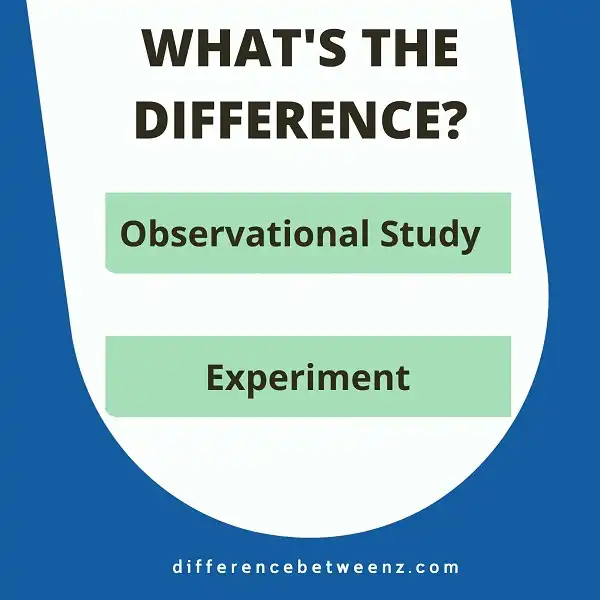Before delving into the difference between observational studies and experiments, it is important to first understand what each type of study entails. Observational studies are conducted in order to identify potential associations between two variables – for example, exposure to a chemical and the development of a disease. Experiments, on the other hand, involve the deliberate manipulation of one or more factors in order to observe the impact that this has on another factor(s). This essay will explore the differences between observational studies and experiments, with a focus on how each type of study can be used to answer different research questions.
What is an Observational Study?
An Observational Study is defined as a type of scientific research that involves observing and recording data on a given phenomenon, without manipulating or directly interfering with the subject being observed. Observational studies are used in many different fields, including medicine, psychology, and sociology. Observational studies can be either prospective or retrospective. Prospective Observational Studies involve observing subjects from the start of the study to the finish, in order to track the progression of a given condition or disease.
Retrospective Observational Studies, on the other hand, involve studying subjects who have already been diagnosed with a condition or disease, in order to better understand its causes and effects. Observational studies are considered to be less reliable than other types of research, such as clinical trials, due to their lack of control over variables. However, they can still be useful in providing valuable insights into a given phenomenon.
What is an Experiment?
An experiment is a scientific procedure that is conducted in order to test a hypothesis. Experiments are an important part of the scientific method, and they can be used to support or disprove a theory. In order to be considered a valid experiment, it must meet certain criteria. First, the experiment must have a clear hypothesis that can be tested. Second, the experiment must be controlled so that only one variable is being tested at a time. Third, the results of the experiment must be reproducible so that other scientists can verify the findings. Experiments are essential for furthering our understanding of the world around us, and they have led to some of the most important scientific discoveries in history.
Difference between Observational Study and Experiments
Observational studies and experiments are both research methods used to collect data and information. Observational studies involve observing and recording behavior, while experiments involve manipulating a variable to see its effect on another variable. Observational studies are considered non-experiments because the researcher does not have control over the variables being studied. Experiments, on the other hand, are considered to be more reliable because the researcher can manipulate the variables and ensure that extraneous variables are controlled. Observational studies are best used to study natural phenomena, while experiments are better suited for studying cause and effect relationships.
Conclusion
The two main types of studies are observational and experimental. Observational studies watch what happens without interfering, while experiments test a specific hypothesis by manipulating one or more factors. In the scientific community, there is a lot of debate about which type of study is better. Experimental research is seen as being more reliable because it allows for tighter control over variables, but observational research can be valuable in identifying potential relationships between factors.


